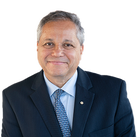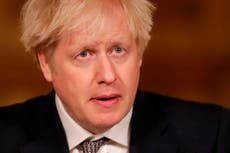Effective leadership is the ultimate vaccine against coronavirus
Decision-makers are the key to healthy nations and prosperous economies. It’s vital those in power valorize science, and show humility, empathy and solidarity

Your support helps us to tell the story
From reproductive rights to climate change to Big Tech, The Independent is on the ground when the story is developing. Whether it's investigating the financials of Elon Musk's pro-Trump PAC or producing our latest documentary, 'The A Word', which shines a light on the American women fighting for reproductive rights, we know how important it is to parse out the facts from the messaging.
At such a critical moment in US history, we need reporters on the ground. Your donation allows us to keep sending journalists to speak to both sides of the story.
The Independent is trusted by Americans across the entire political spectrum. And unlike many other quality news outlets, we choose not to lock Americans out of our reporting and analysis with paywalls. We believe quality journalism should be available to everyone, paid for by those who can afford it.
Your support makes all the difference.Jacinda Ardern recently declared a climate emergency, sending a signal to the world that leaders need to show leadership to tackle global challenges. Similarly, she has steered her country effectively through the Covid-19 crisis. The final common pathway for tackling inter-linked global challenges is leadership.
Power, politics and policy have long been recognised as among the key determinants of health. However, Covid-19 has brought political elements into sharper focus, placing an emphasis on leaders and their ability to govern effectively.
There are definitely better days ahead, but a harsh winter will come before the Covid-19 spring. Although we may be tired of the virus, it is not tired of infecting us. The current situation calls for leadership to save as many lives as possible, with public health measures and effective and equitable roll-out of the vaccine – one of the most complex national and global operations since the Marshall Plan, following the devastation of the Second World War.
Countries vary in Covid-19 death rates by a factor of more than 100. Key elements that have led to success are not just preparedness and strong health systems, but trust between people and government. The foundation of this trust is effective leadership – from local communities to heads of international organisations, and the highest levels of government in the most powerful nations.
First and foremost, leadership requires the courage to tell the truth to the public even when the news is bad, and the truths are hard to accept. Truthful leaders valorise science, evidence and data, and these factors drive decisions. They acknowledge weakness, admit mistakes, seek help, and share information – not only with their own people but with other countries because this will be good for all countries.
Effective leaders are humble enough to learn from other countries that have faced similar challenges and to recognise that there’s no such thing as virus exceptionalism. Covid-19 has shown that the global north can learn lessons from the south; the west from the east; and the present from the past.
Some countries have made good use of their earlier experience with Sars from 2003 and with contact tracing for other diseases like Ebola and polio. Some mounted a comprehensive response to Covid-19, such as Mongolia, South Korea, Rwanda, Thailand and Vietnam. These examples cut across different political systems.
Showing empathy towards the families of the 1.6 million people who have died and many more who have lost their health or livelihood is itself an act of leadership, as is exhibiting respect towards health workers and essential workers who put themselves in harm’s way to serve their communities.
Since Covid-19 preys on inequities – including gender, race, and socioeconomic status within and among countries – leadership requires standing with marginalised communities. Countries with female leaders, including Finland, Iceland, Germany and New Zealand, have done particularly well in tackling the virus, in part because they have invested in rolling out testing, which has helped them identify where the virus is and break chains of transmission.
Because none of us is safe until all of us are safe, and because global challenges require multilateral solutions, effective leaders emphasise solidarity. Recent news regarding highly effective vaccines, resulting from an unprecedented scientific effort, is extremely encouraging and bodes well for 2021 if leaders put ending the pandemic everywhere ahead of narrow nationalistic goals. The WHO-led Access to Covid Tools Accelerator, which has an immediate need for $3.7bn (£2.7bn) in funding, is a concrete instantiation of solidarity.
Leaders communicate hope to their citizens, who have endured a discombobulating and often devastating year. The world defeated smallpox; polio is on the cusp of being eradicated, and we will end this pandemic. The best and fastest way to do that is together.
As Dr Tedros said, “Leadership has been severely tested by the Covid-19 pandemic. And it’s fair to say that, too often, it has been found wanting.” But it’s never too late for leaders to step up – rather than give up – and to take the decisions that put their countries on the road to defeating Covid-19.
The big reveal of the pandemic is that trust is essential to health. Leadership builds (or destroys) trust, and the return (or cost) of leadership is measured in citizens’ lives and livelihoods, often those most vulnerable and marginalised.
Covid-19 has taught us that health is the foundation of prosperous economies and secure countries, and that leadership is the ultimate vaccine against the inter-linked global challenges of health, climate, conflict, and inequality.
Dr Peter Singer is special advisor to the director general, Dr Tedros Adhanom Ghebreyesus, and assistant director general of the World Health Organization





Join our commenting forum
Join thought-provoking conversations, follow other Independent readers and see their replies
Comments